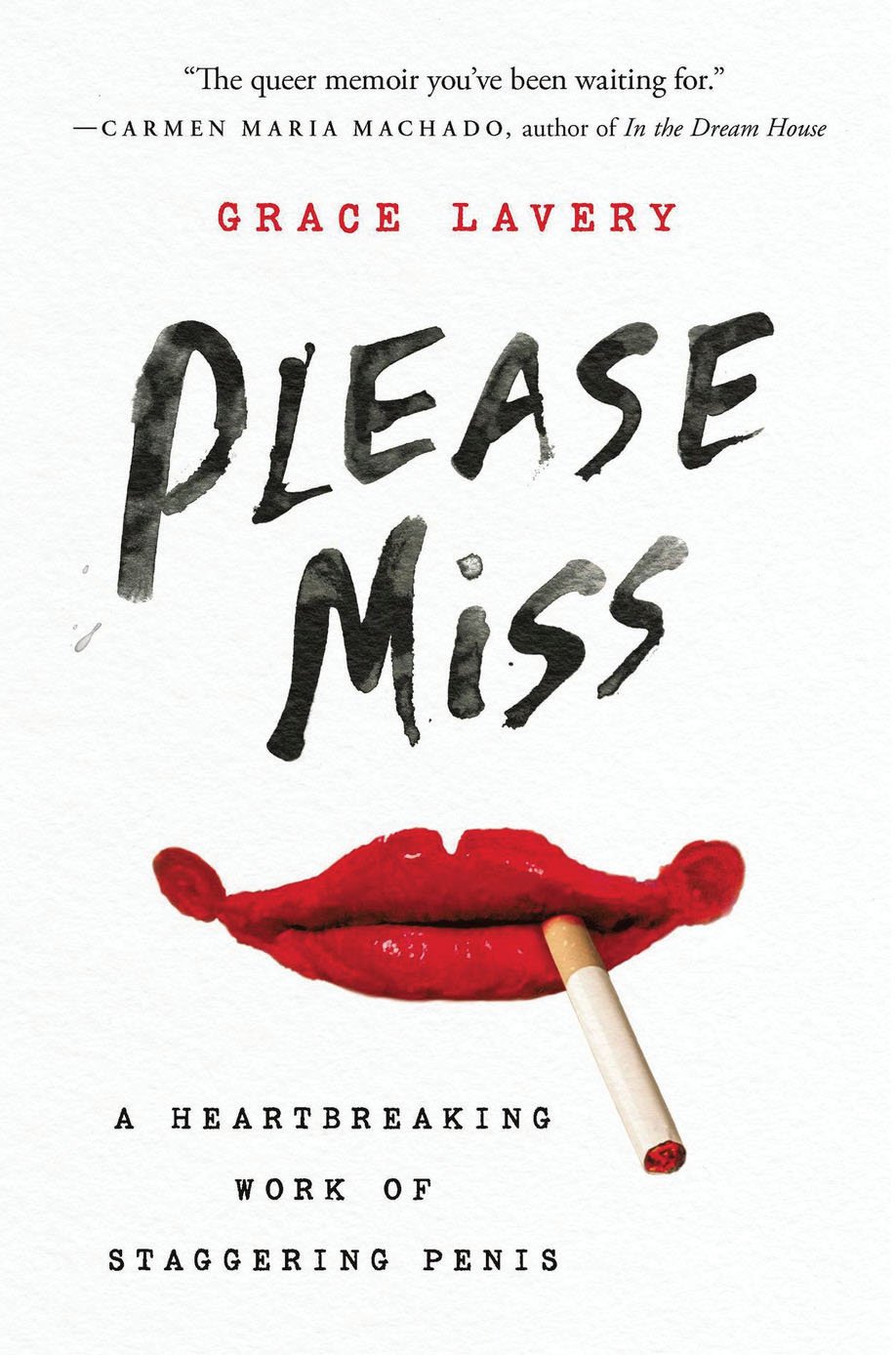
I once saw Grace Lavery do a reading—more like what comedians call a tight five—and it killed. The text of that performance is in Please Miss, but it didn’t work for me on the page. I wanted to love this book but didn’t. And so I find myself in the awkward position of having to explain my mixed reactions to a book by a trans sister, one whose other work I deeply admire.
Lavery offers a model for trans-affirming criticism early in the book—the critic’s encounter is mediated through trans community before approaching the object itself. Were I to apply that to this book, the question becomes: How does this trans woman’s work seem, mediated through those corners of our shared experience that I know? What I find is writing whose tic is to continually distance itself from any sense of being “one of us.” To Lavery, other trans women’s accounts of their experience seem too glamorous—but also too ordinary.
Lavery is aware of this tendency: “I would listen to trans women talk about the regular difficulties of their lives, and I would feel myself different from them. Not like them: disidentification, I think, is an important moment in any transition because it prepares one to recognize one’s identity with them in due course . . .” The book doesn’t take that second step of reidentification. It maintains its distance from trans women as a kind and as a culture. Sure, several other trans women writers are mentioned, but these feel like gestures of public alliance rather than community, friendship, or love.
It is inevitable in a trade book that it will address a majoritarian readership—in this case, of cis people—but Please Miss seems particularly preoccupied with writing under the gaze of the kind of “gender-critical” feminists who hate us and desire the moral and legal prohibition of our kind. The “Grace Lavery” that emerges does so not with measured distances and affinities to a matrix of other variations on trans femininity but as a display of defensive tactics against an enemy. Its ground tone is paranoia.
“There are as many genres of transness as there are genres,” Lavery writes. This book’s strategy in relation to all of these readerships—trans, cis, and the haters in particular—is one of excess. It’s a tactic many trans women will recognize: make yourself look big, wild, unpredictable. It scares them off. There are extended discursions into other genres, styles, voices—bits, some of which are brilliant. (The trans reading of Wilde’s Salome, for example.) As Lavery mentions more than once, her impulse is to want to appear clever, and the text succeeds in drawing attention to its cleverness. It’s a text that wants to impress rather than seduce.
When not showing off, the book is really rather likeable and interesting, not least in relation to the collective experience of trans women. Those of us who are writers struggle with the pressure put on us to write memoirs, and to write ones with a certain narrative arc. Some of us also share Lavery’s understanding of how opaque our own subjectivity is to us. People make up stories that make sense of their lives, but if there’s a truth to the self, it’s not that—it is hidden in whatever memoir elides.
Those of us who are trans but aren’t writers will also find points of both singularity and difference in those parts of the book where Lavery lets her guard down for a bit. For example, many of us have complicated feelings about having been born with dicks. As the Lacanian psychoanalysts say, they’re weak, fallible, fleshy stand-ins for the phallus, that triumphant sign of patriarchal power. Even for cis men, they’re kind of a problem. They seem continually afraid someone will cut their dicks off, thus denuding them of the wiggly appendage which supposedly marks them as men.
What if the clown was a repressed trans woman? What if he came out?
What if his too-muchness could find another location in the cultural field?
So, the dick is doubly a problem if you’re born with one but figure out, early or late, that you’re not a man. You don’t want to be marked by the sign of the phallus—but you still have a dick. Especially if your dick was a big one, and you liked to fuck with it. Fuck women with it. As Grace’s soon-to-be ex-girlfriend says, it’s as if Lavery was trying to fuck her way into her body, which is where I wrote in the margin: girl, same!
This is not every trans woman’s story, of course, but it is, as they say, relatable—as is the experience of growing up with some mark of femininity somewhere on oneself that it seems everyone else can read. We are expected to turn out to be gay men of a recognizable type, which is awkward for those of us attracted to women, not to mention confusing for all involved.
It’s impossible for me not to feel tender toward a pre-transition Lavery, for whom the world of men is alien and who longs to be among the women. That, too, is a common experience, particularly among transsexual lesbians, as is Lavery’s solution to the masculinity problem: not to hide in the shadows but to go large. To be the “David Bowie of California English professors.” Some of us hid by being very public, creating additional difficulties for transitions, which then have to negotiate the residual impression we’ve already made not just on friends and loved ones but a “public.”

Photo by Tayler Smith.
Some of the most moving pages are on Lavery’s struggle with addiction. There’s no necessary connection between transness and addiction other than probability. If you’re deeply uncomfortable in your assigned sex, you might end up with some hardcore ways of coping. Drink and cocaine were not my thing, but this was another same, girl! moment for me as a reader. The differences in how trans women try to cope form a pattern without collapsing into sameness.
One coping mechanism, and not just for transness, is learning. Lavery says, “One could say that my obsession with education has been one of my more durable kinks.” I’d put more emphasis than Lavery does on the uneven distribution of access to academe. Lavery doesn’t have much by way of a sociological imagination.
Still, even among those of us who, for reasons of class, race, or abandonment by family, didn’t get to deflect our desires into formal schooling, there’s the transsexual autodidact. Learning is a popular trans kink, as is turning that into art and pedagogy, formal or informal. If one were to pull back and look at the situation with a broader cultural and sociological lens, one would see this book as joining a matrix of transsexual artmaking and textmaking that has been around for a long time and has always been surprisingly erudite, but which might now be consolidating into a shared culture with enough institutional purchase to secure a trace of our existence beyond eradication.
The clown is a recurring figure in the text as an excessive, disturbing sign of a kind of white masculinity: dicks for feet, dick for a nose. He’s the double of a kind of pleasure-denying, plain-speaking white dude who is always intervening to disrupt the play of everyone who is not him. What if the clown was a repressed trans woman? What if he came out? What if his too-muchness could find another location in the cultural field?
It’s a move that’s been made successfully among trans women who came up through drag. I think of Vaginal Davis or, more recently, Macy Rodman and Lauren John Joseph, who took parodic femininity and found a core to it that isn’t so much more “real” as having a weightier range of feelings and connections to lived experience. The clown is an altogether more intractable figure than the drag queen to make work in concert with the fabric of trans culture. I deeply admire the attempt, but in the end it fell flat.
Perhaps it’s the unconscious nature of clowning to set itself up for a fall. The other side of the text’s assertive cleverness is its willingness to exceed to the point of collapse, which is where I find my empathy and compassion engaged again. Lavery occupies a position marked out for us by our enemies to laugh at, does an astonishing trick or two—and a pratfall. In that way, Please Miss is almost sacrificial; Lavery does it so we don’t have to. I love her for that.

